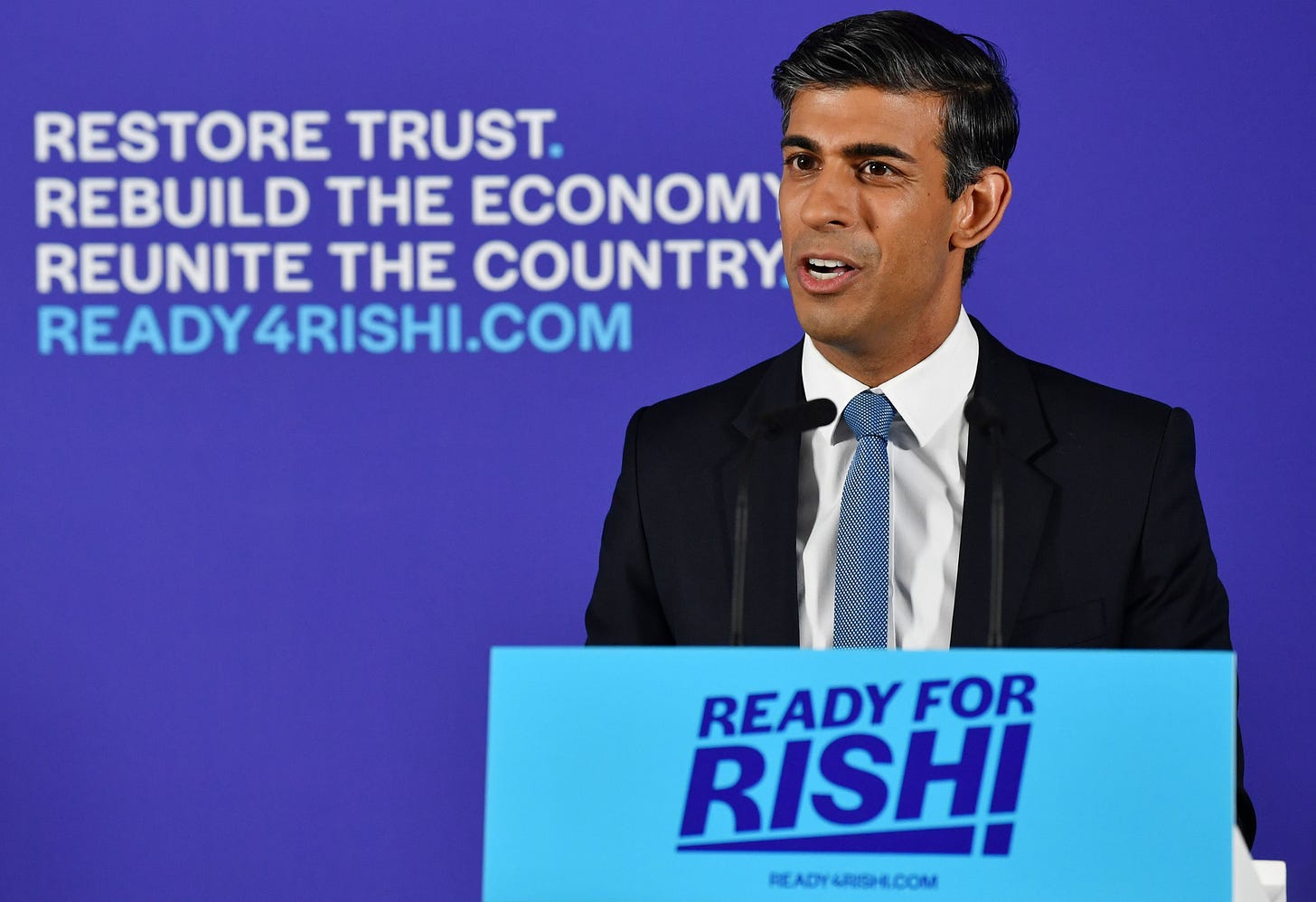First Draft #20: a newsletter on public language
Decorum; smashed it; to coal and back
Sunak, Truss and the limits of decorum
The big rhetorical question posed by the BBC debate between Rishi Sunak and Liz Truss was that of decorum. Mr Sunak had clearly decided he wasn’t going to let Ms Truss get away with talking nonsense when he had nonsense of his own to offer. So, whenever she set off on one of those answers that always seem to grind to a halt without ever going anywhere, Mr Sunak jumped in with an exasperated cry of “yes, but Liz…”. The initial reaction was that he was entitled and rude, that he had committed an offence against decorum.
Decorum has its origin in rhetoric. It is the name Cicero gives to the need to pay respect to your setting. To be indecorous is to misjudge the moment and therefore lessen the persuasive effect. Perhaps this is what Mr Sunak did. In his haste to present himself as the truth-teller, the counter to the Truss fantasy, he may have acted indecorously. His method may have undermined his attempt to persuade us that his opponent was purveying a form of madness.
Yet this would be a strangely puritanical verdict. Mr Sunak did interrupt quite a lot, but then, so what? A lot that Truss said was worth disagreeing with. And he is bidding to be Prime Minister, not second in command on the Rotary club gala committee. Interruption is a relatively trivial offence in these circumstances.
Of course the character of a speaker counts in the verdict. But to discount the substantive differences between the two candidates, and refer only to the rhetorical procedure of the debate, really does leave almost everything out. It surely matters that Mr Sunak was trying to be honest about the state of the public finances while Ms Truss was playing to the gallery on tax cuts. Rather than flatter his audience, an obvious temptation, Mr Sunak chose to construct a character, Prime Ministerial in intent, that could tell the truth that few want to hear but which all know to be unavoidable.
Next to this serious question, we should be able to bear a few interruptions. Decorum matters but it doesn’t matter that much. @PhilipJCollins1
Bad language: Smashed it
“Guys we totally smashed it!” chimed Rishi Sunak to a room of giddy acolytes in his recent promo vid. “Smashed it” isn’t inherently bad. There is poetry in equating success with destruction. The problem, instead, is overuse. Everyone is smashing it these days. Politicians. Presenters. Sports stars. Reality TV contestants. If a task is completed anywhere in Britain, a chorus of “smashed it” is near guaranteed. Drained of vividness by ubiquity, the phrase has become the ultimate verbal signifier of an imagination deficit. Which is fine if you’re an athlete. Less so if you’re vying to lead the country. Also, note how the preceding “totally” multiplies the lameness. A reminder that bad writing can always be made worse by empty adverbs. @AlexDymoke
To coal and back: today’s green transition isn’t the first
Today we’re being urged to shift from fossil fuels to renewables. Centuries ago, it was coal that was hailed as the exciting new power source. Learning how we fell in love with coal can help us fall out of love with it.
Until the early 1800s, US households burned mainly wood. Forests were abundant. Logs were cheap. But as cities expanded, demand for timber soared. Rampant deforestation destroyed habitats and turned firewood into an expensive commodity.
The solution: coal. More plentiful and energy efficient than wood, coal would fuel America’s transformation into an industrial nation. But there was a problem. Coal was expensive and hard to light. And people felt attached to the dancing flames and familiar aromas of their wood-lit hearths.
To change perceptions, the mining industry launched a massive marketing campaign, with influential figures enlisted to extol the joys of coal. But it wasn’t until technology improved, and coal became easier to transport and cheaper to burn, that the US fully embraced it.
Therein lies the first lesson for today’s activists. Where energy is concerned, price will always trump persuasion. Until renewables are cheap to produce and store, no amount of rhetoric will bring the end of fossil fuels.
The second lesson is more optimistic: where once it was impossible for Americans to imagine a world without their wood-burners, the triumph of coal shows that, with the right incentives, old habits, no matter how deep-rooted, can go up in flames. @Zachdhardman
Jargon buster: Bold
In the past week alone, the government has declared a “bold new approach to roadworks” (which entails using slightly fewer traffic cones), scientists have taken “bold sustained action” to protect wild salmon (with the creation of a “salmon database”) and a Welsh MP has described a new cycle lane in Bridgend as “bold action to tackle climate change”. If you really are defying convention, your boldness will speak for itself. If not, remember that declaring yourself “bold” is just about the most conventional thing you can do. @_alice_elliott
Trust not those who speak of trust
Each year, Edelman publishes its “trust barometer" and the result is the same: no-one trusts businesses. The obvious headlines are written, hands are wrung, and Edelman – a PR firm – doubtless uses the opportunity to sell its “corporate reputation” services.
But “quis custodiet ipsos custodes?” asked the Roman satirist Juvenal, usually translated as: “who watches the watchmen?” Politico, it seems. Last week, they published Edelman’s pitch to launder the reputation of the Saudi Kingdom, a nation dubbed a “pariah” by America’s president on the campaign trail just four years ago.
Edelman’s unprincipled pitching contains its own lesson about trust. Rather than obsess over whether a company is trusted today, it should consider whether it is worthy of that trust. Edelman charges extravagant fees for its services. But sometimes the simplest advice works best: just do the right thing. If Edelman is to continue proselytising its doctrine of trust, it is advice they would do well to heed. @joshuahwilliams
Language and beyond
“Even among the truly rich, there is a gap between the haves and the have-yachts”. The New Yorker’s fascinating investigation into the secretive world of super, mega and giga-yachts, which shows that, despite global economic turmoil, big boats are booming.
Baby speak is universal – no matter the culture, creed, country or language, we all talk to infants in the same way, a new study has found.
“In order to live up to its name, democracy must be open to free communication and expression; yet that very feature opens democracies up to the forces of chaos, fragmentation and demagoguery that undermine them.” Ezra Klein interviews political scientist turned journalist Sean Illing about his new book, “The Paradox of Democracy”, which argues modes of communication determine politics.
James Marriott on Austen, Netflix and the emergence of modern consciousness: “And then you turn into the room marked “Austen” and it’s as if somebody has invented perspective, three-dimensional space, chiaroscuro and how to draw hands all at once. At this point, on every English literature course, the class feels it has stepped into sunshine and clean summer air.”
Inventive viral ad targeting Texas governor Greg Abbot who last year signed a bill outlawing abortions after six weeks.
“...on the one hand, we have access to a broader range of information and insight than any generation in history, which ought to make us all more interesting. On the other, it’s very difficult, amidst the crossfire hurricane of influence, to think and act for yourself – to be you.” An insightful Ian Leslie essay on the complicated art of being influenced.
Psychology writer David McRaney once believed people don’t change their minds. Then he changed his. His new book How Minds Change investigates big shifts in public opinion, and concludes attentive listening is more persuasive than bombarding people with facts.
Rory Stewart charts the history of argument in his new Radio 4 series, From Socrates to Social Media.
“The optimistic assessment from experts who study authoritarianism globally is that the United States will most likely settle into a dysfunctional equilibrium that mirrors a deep democratic breakdown.” Political scientist Brian Klaas with a level-headed analysis of the US’s democratic drift.
New from us
Phil on why Labour has little reason to fear Truss or Sunak.
Josh on Sajid Javid’s clumsy resignation speech.
Follow us
Last thing…
At The Draft we’re specialists in writing and rhetoric. We help businesses and public figures make their case more persuasively. If you could use our help, get in touch. And if you enjoy First Draft, forward it on. Thanks for reading.




Very good as always, but the line from Juvenal is typically translated as ‘who shall guard the guards themselves’ - and although the context is not political (it is about the attendants of the dissolute empress Messalina) - it is frequently cited in reference to the Praetorian Guard, who were intended to protect emperors but often got rid of them in return for a handsome bonus from the new guy (‘donative’ in the jargon).